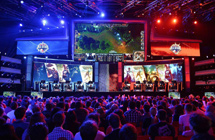研究发现:游戏打得好智商更高
|
If you're good at games, you might also be good at everything else. That's according to a new study that found two of the world's most popular video games act like IQ tests. Those who are the best at them also get the highest scores on traditional intelligence tests, suggesting that video games might actually make you smarter. Both games – League of Legends and Defence of the Ancients 2 (DOTA 2) – combine strategic thinking with quick reactions, and so could both reward and train up particular kinds of thinking.
That seemed to be confirmed by the study, which compared people's levels of skill in the games with their IQ. The better people were at playing, the more their intelligence score, it found. A similar study that looked at chess suggested that more conventional games are good markers of intelligence, too. Professor Alex Wade, from the University of York, said: "Games such as League of Legends and DOTA 2 are complex, socially-interactive and intellectually demanding. "Our research would suggest that your performance in these games can be a measure of intelligence. "Research in the past has pointed to the fact that people who are good at strategy games such as chess tend to score highly at IQ tests. "Our research has extended this to games that millions of people across the planet play every day." League of Legends and DOTA 2 are both Multiplayer Online Battle Arenas or Mobas, action strategy war games typically involving two opposing teams of five individuals. In one study, the York team matched performance in League of Legends with scores from standard pen-and-paper intelligence tests. Another part of the research analysed data from large groups of thousands of people playing the games. The researchers found that First Person Shooter games in which players view the action through the eyes of characters they control did not demonstrate the same link with IQ. York PhD student Athanasios Kokkinakis, the study's lead author, said: "Unlike First Person Shooter (FPS) games where speed and target accuracy are a priority, Multiplayer Online Battle Arenas rely more on memory and the ability to make strategic decisions taking into account multiple factors." The findings appear in the journal Public Library of Science ONE. |









